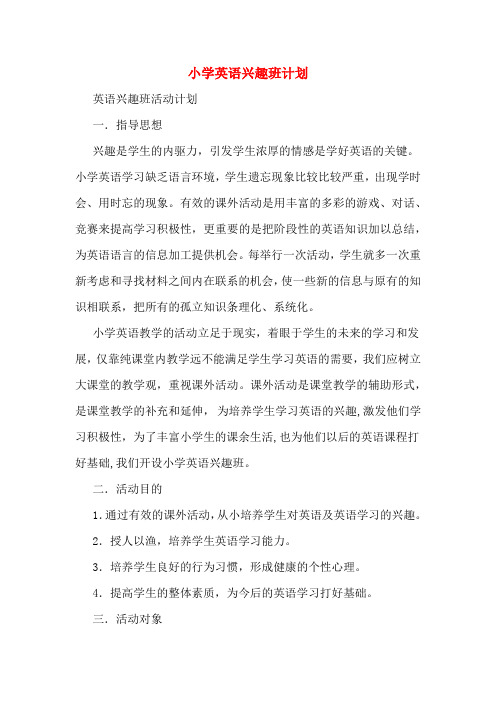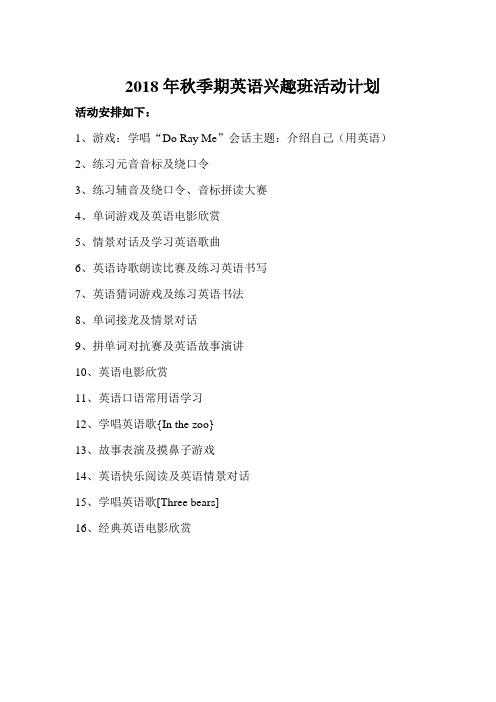英语兴趣班
- 格式:doc
- 大小:4.94 KB
- 文档页数:1

幼儿的英语兴趣班特色教学计划坚持科学的进展观,坚持以改革创新为动力,以全面提高幼儿身体素养、培育幼儿制造力和想像力、激发幼儿对科学领域的爱好、教给幼儿粗浅的学问为重点,提高幼儿多方面的素养。
下面是我整理的适合幼儿的幼儿的英语爱好班特色教学方案5篇,欢迎大家阅读共享借鉴,盼望大家喜爱,也盼望对大家有所关心。
幼儿的英语爱好班特色教学方案1本学期我担当计算、健康两领域的教学,同时担当了本班特色课英语的教学。
(一)健康领域1、喜爱参与幼儿园各种集体活动。
2、初步养成良好的生活、卫生习惯,具有基本的生活自理力量。
3、具备初步的平安保健学问,学习对自己的身体进行适当的爱护。
4、乐观参与体育活动,要求动作基本做到轻松协调。
(二)科学领域1、对四周新颖、好玩的事物和现象有明显的爱好和奇怪心。
2、尝试运用各种感官感知四周环境中的物体和现象,喜爱探究和提问。
3、喜爱与同伴合作,尝试用多种方式表达、沟通探究的过程和结果。
4、喜爱在生活和嬉戏中学习运用简洁的数、形、时空等数学学问,能在成人的指导下学习使用比较、分类、排序等方法。
5、关怀四周环境、爱惜动植物,萌发初步的环境意识。
(三)英语学习的目标1、通过各种各样的嬉戏活动,培育幼儿对英语的爱好。
2、幼儿把握正确的英语发音。
(四)保育目标1、协作生活老师做好班级内与外的卫生同时,并能按要求将班级物品摆放整齐归类放好,教育幼儿要爱惜班级物品。
2、养成饭前便后准时洗手的习惯,照看好幼儿的两餐两点,对进餐慢的幼儿进行教育,并告知幼儿不行以挑食,饭粒不行以掉在桌上和地下,要珍惜粮食(五)常规教育目标1、礼貌先从自我做起,对领导、同事、家长都要面带微笑向人主动问好。
给幼儿带个好头,并严格要求自己的言行举止,同时培育幼儿成为一名尊老爱幼、讲礼貌文明的好孩子、能友好与他人相处。
2、课堂活动纪律要正确引导幼儿上课的坐椅子姿态、培育良好的课堂常规;不许任凭下位置、回答问题时要举手、并学会敬重他人,宁静地倾听他人的发言,养成不任凭打乱别人的讲话。

英语兴趣班教学计划一、教学内容1. 词汇:包括baseball, basketball, football, table tennis, badminton, swim, play the guitar, play the piano等运动和艺术的词汇。
2. 语法:一般现在时态的肯定句、否定句和疑问句。
3. 功能句型:What do you usually do after school? Iusually play basketball/listen to music/read books, etc.after school.4. 听力练习:根据听到的对话,选择正确的答案。
二、教学目标1. 学生能够掌握本节课的生词和短语,并能正确地运用到句子中。
2. 学生能够理解并运用一般现在时态的肯定句、否定句和疑问句。
3. 学生能够熟练地运用本节课的功能句型进行日常交流。
三、教学难点与重点1. 重点:生词和短语的掌握,一般现在时态的肯定句、否定句和疑问句的运用。
2. 难点:听力练习的准确理解和功能句型的熟练运用。
四、教具与学具准备1. 教具:多媒体教学设备、黑板、粉笔。
2. 学具:课本、练习册、录音机、磁带。
五、教学过程1. 热身(5分钟)教师与学生进行简单的英语对话,询问学生周末的活动,引导学生谈论自己的兴趣爱好。
2. 呈现(10分钟)教师通过多媒体展示本节课的生词和短语,引导学生跟读并模仿。
然后,教师通过例句展示一般现在时态的肯定句、否定句和疑问句的用法。
3. 练习(15分钟)学生分组进行听力练习,根据听到的对话,选择正确的答案。
教师选取几组学生的答案,进行讲解和反馈。
4. 课堂活动(10分钟)学生分成小组,根据本节课的功能句型,编写一段对话,并在班级进行展示。
教师选取几组学生的对话,进行点评和指导。
六、板书设计1. 生词和短语baseball, basketball, football, table tennis, badminton, swim, play the guitar, play the piano2. 一般现在时态肯定句:I usually play basketball/listen to music/read books, etc. after school.否定句:I don't usually play basketball/listen tomusic/read books, etc. after school.疑问句:What do you usually do after school?七、作业设计1. 题目:根据本节课的内容,编写一段对话,要求使用一般现在时态。

英语作文兴趣班
English:
I believe taking an interest class is a great way to explore new hobbies and skills. It provides an opportunity to learn something that you are passionate about and to meet like-minded individuals. Interest classes can range from art, music, dance, cooking, to coding, and much more. By enrolling in an interest class, one can not only develop new skills but also gain a sense of accomplishment and fulfillment. Moreover, it offers a chance to break away from the daily routine and discover new passions or talents that one may not have been aware of before.
中文翻译:
我认为上兴趣班是探索新爱好和技能的绝佳途径。
它提供了学习自己热爱的东西、结识志同道合的人的机会。
兴趣班的内容可以包括艺术、音乐、舞蹈、烹饪、编程等等。
通过参加兴趣班,我们不仅可以发展新的技能,还能获得成就感和满足感。
此外,它还提供了打破日常生活常规、发现之前未曾意识到的新爱好或才能的机会。

小学英语兴趣班计划英语兴趣班活动计划一.指导思想兴趣是学生的内驱力,引发学生浓厚的情感是学好英语的关键。
小学英语学习缺乏语言环境,学生遗忘现象比较比较严重,出现学时会、用时忘的现象。
有效的课外活动是用丰富的多彩的游戏、对话、竞赛来提高学习积极性,更重要的是把阶段性的英语知识加以总结,为英语语言的信息加工提供机会。
每举行一次活动,学生就多一次重新考虑和寻找材料之间内在联系的机会,使一些新的信息与原有的知识相联系,把所有的孤立知识条理化、系统化。
小学英语教学的活动立足于现实,着眼于学生的未来的学习和发展,仅靠纯课堂内教学远不能满足学生学习英语的需要,我们应树立大课堂的教学观,重视课外活动。
课外活动是课堂教学的辅助形式,是课堂教学的补充和延伸,为培养学生学习英语的兴趣,激发他们学习积极性,为了丰富小学生的课余生活,也为他们以后的英语课程打好基础,我们开设小学英语兴趣班。
二.活动目的1.通过有效的课外活动,从小培养学生对英语及英语学习的兴趣。
2.授人以渔,培养学生英语学习能力。
3.培养学生良好的行为习惯,形成健康的个性心理。
4.提高学生的整体素质,为今后的英语学习打好基础。
三.活动对象本校四年级学生,本着自愿的原则报名参与。
四.活动内容1.学唱少儿英语歌曲、英语儿歌、做英语游戏、看、听、学、讲、演英语小故事等。
2.拟以《新理念新课堂》为蓝本,掺杂适合本校四年级学生的各种教材,内容主要包括学习生活常用句型和词汇,包括问候用语、初次见面用语、客套用语、公共场合特定用语等等。
五、活动时间:每周六上午10:00—11:30六、活动地点:四(3)班教室。
东方实验小学2+1舞蹈计划舞蹈活动内容与教育性和艺术性相结合,适合学生的年龄特点,它有利于提高学生学习舞蹈的兴趣,培养孩子们正确的形体姿态和良好的气质,增强集体意识,培养学生的乐感。
活动面向部分学生,又组织,有计划的进行,坚持自愿参加和普及提高的原则,让学生在唱唱、跳跳、动动中去感受音乐,理解音乐和表现音乐。

2018年秋季期英语兴趣班活动计划活动安排如下:
1、游戏:学唱“Do Ray Me”会话主题:介绍自己(用英语)
2、练习元音音标及绕口令
3、练习辅音及绕口令、音标拼读大赛
4、单词游戏及英语电影欣赏
5、情景对话及学习英语歌曲
6、英语诗歌朗读比赛及练习英语书写
7、英语猜词游戏及练习英语书法
8、单词接龙及情景对话
9、拼单词对抗赛及英语故事演讲
10、英语电影欣赏
11、英语口语常用语学习
12、学唱英语歌{In the zoo}
13、故事表演及摸鼻子游戏
14、英语快乐阅读及英语情景对话
15、学唱英语歌[Three bears]
16、经典英语电影欣赏。

幼儿园英语之旅:英语学习兴趣班开班流程方案一、前言在当今社会,英语作为全球通用的语言,越来越受到重视。
为了让孩子在未来的竞争中具备更多的优势,很多家长开始注重孩子在幼儿园阶段就开始学习英语。
为了满足家长和孩子的需求,幼儿园开设英语学习兴趣班已经成为一种常见的现象。
本文将就幼儿园开设英语学习兴趣班的开班流程方案进行详细探讨。
二、评估现状要开设一门英语学习兴趣班,首先需要评估现状。
幼儿园所在地区家长对英语学习的需求程度、现有英语教师队伍的专业水平,以及幼儿园的教学条件和设施等都是需要全面考虑的因素。
1. 家长需求评估在当前社会中,随着国际交流日益频繁,大部分家长都意识到孩子接受英语教育的重要性。
首先需要进行一次详细的调查,了解家长对于幼儿园开设英语学习兴趣班的需求程度。
2. 教师队伍评估教师是教育质量的关键,所以需要对幼儿园现有的英语教师队伍进行评估,了解他们的教学经验、外语水平和教学方法等方面的情况。
3. 教学条件评估教学条件是决定学习效果的重要因素之一。
需要对幼儿园的教学设施、教学用具以及学习环境等进行全面评估,确保能够提供良好的学习条件。
通过以上的评估,可以得出开设英语学习兴趣班的必要性和可行性,并为后续的开班流程方案提供依据。
三、开班流程方案1. 制定课程目标在确定开班流程方案之前,首先要确定课程目标。
英语学习兴趣班的主要目标应该是培养幼儿对英语的兴趣和基础能力,让他们在轻松愉快的氛围中获得初步的英语语言能力。
2. 制定课程内容在制定课程内容时,可以根据幼儿的芳龄特点和学习能力,设计一些生动有趣的英语启蒙课程,比如英语歌曲、故事、游戏等,以吸引幼儿的注意力,让他们在玩中学,从而提高英语学习的效果。
3. 招生宣传为了吸引更多的幼儿参加英语学习兴趣班,需要进行一系列的招生宣传活动。
可以利用幼儿园开放日、家长会、校园广播等多种渠道,进行宣传活动,让更多的家长了解并报名参加。
4. 师资力量配备对于开设英语学习兴趣班,需要配备具有专业英语教学经验的教师,他们要有引导幼儿学习英语的能力,也要有足够的耐心和爱心,以便能够更好地教导幼儿。
小学英语三年级兴趣班教学计划
一、指导思想
兴趣是学生的内驱力,引发学生浓厚的情感是学好英语的关键。
农村小学英语学习缺乏语言环境,学生遗忘现象比较比较严重,出现学时会、用时忘的现象。
长此以来,会导致一部分学生成绩偏差,慢慢对英语学习失去兴趣,影响老师的正常教学。
小学英语教学的活动立足于现实,着眼于学生的未来的学习和发展,仅靠纯课堂内教学远不能满足学生学习英语的需要,我们应树立大课堂的教学观,重视课外活动。
课外活动是课堂教学的辅助形式,是课堂教学的补充和延伸,
二、活动目的
1、通过有效的课外活动,从小培养学生对英语及英语学习的兴趣。
2、授人以渔,培养学生英语学习能力。
3、培养学生良好的行为习惯,形成健康的个性心理。
4、提高学生的整体素质,为日后学习英语打好基础。
三、时间:周五下午
五、地点: 3.1班教室
六、参加者:三年级英语爱好者20名
七、活动形式:所有的孩子对阅读和观看英语电影有很浓厚的兴趣,本学期我们兴趣小组,将对学生的阅读技巧方面加强培训。
针对以上情况本学期将安排以下活动:
第一、二周:阅读绘本完成阅读反馈
第三、四周:学习英语歌
第五、六周:观看英文电影
第七、八周:学习英语歌
第九、十周:阅读绘本完成阅读反馈表
第十一、十二周:自选作品,阅读练习
第十三、十四周:自选作品,阅读练习
第十五、十六周:期末复习
通过开展多种形式的英语学习活动,培养我校学生英语学习兴趣,加强英语听力和口语训练,提高学生英语交流水平。
八、活动措施
1、充分利用录音磁带和视频教学、图书室的资源进行训练
2、学习英文歌(全体参加)。
英语兴趣班的作文I love English interest classes. It's so much fun to learn new words and phrases. The teacher always makes the class interesting by using games and activities to help us remember the new vocabulary. I never get bored in English class because there's always something new to learn.In English class, we also get to practice speaking and listening. I used to be shy about speaking in front of the class, but now I feel more confident. The teacher encourages us to talk to each other and practice our pronunciation. It's great to see how much I've improved since the beginning of the class.One of the best things about English class is that we get to read interesting stories and articles. I love reading about different cultures and traditions from around the world. It's amazing how much you can learn from reading in another language. I always look forward to the reading assignments in English class.I also enjoy writing in English class. We get to write about our own experiences and share them with the class. It's a great way to practice our writing skills and get feedback from our classmates. I've become a much better writer since I started taking English classes.Overall, English interest classes are a great way to improve my language skills and have fun at the same time. I'm so glad I decided to join the class, and I can't wait to see how much more I'll learn in the future.。
英语兴趣班学期计划英文回答:English is a fascinating language that opens up a world of opportunities. When it comes to planning a semester for an English interest class, there are several key aspects to consider to ensure an engaging and effective learning experience.First and foremost, it's essential to structure the semester in a way that balances different language skills. This means incorporating activities and lessons that cover speaking, listening, reading, and writing. For example, during the first few weeks, we might focus on building vocabulary and grammar skills through interactive exercises and games. Then, as the semester progresses, we can shift towards more communication-based activities such as debates, discussions, and role-plays to enhance speaking andlistening abilities.Another crucial element of the semester plan is variety. We want to keep students engaged and motivated, so it's essential to mix things up and introduce diverse topics and materials. This could include discussing current events, exploring different cultures, or even analyzing pieces of literature or films. By exposing students to a range of content, we not only broaden their knowledge but also cater to different interests and learning styles.Furthermore, incorporating real-life contexts into the lessons can significantly enhance the learning experience. For instance, we can simulate everyday situations like ordering food in a restaurant, making travel plans, or participating in job interviews. This not only helps students apply their language skills in practical scenarios but also boosts their confidence in using English outside the classroom.Assessment is another critical aspect to consider when planning the semester. Rather than relying solely on traditional tests and quizzes, incorporating varied assessment methods such as presentations, projects, andgroup activities can provide a more holistic view of students' progress. Additionally, providing constructive feedback and opportunities for self-reflection can help students track their development and set goals for improvement.Finally, creating a supportive and inclusive learning environment is essential for fostering growth and confidence. Encouraging peer collaboration, celebrating achievements, and being responsive to students' needs and interests can make a significant difference in theirlearning journey. Moreover, incorporating elements of fun and humor into the classroom can help alleviate any anxiety or pressure students may feel about learning a new language.中文回答:学英语是一件很有趣的事情,能够开启广阔的机会。
小学英语口语兴趣班教学计划English Teaching Plan for Primary School English Oral Interest Class1. Course Objectives:- To develop students' confidence and fluency in spoken English- To cultivate students' interest and enthusiasm in learning English- To improve students' listening and speaking skills through interactive activities- To provide a fun and engaging learning environment for students2. Target Audience:- Primary school students aged 7-12 years old- Students with varying levels of English proficiency, from beginner to intermediate3. Course Content and Teaching Strategies:- Warm-up activities: Icebreakers, songs, and gamesto create a relaxed and enjoyable atmosphere- Vocabulary and pronunciation practice: Introducing new words and phrases through interactive exercises, tongue twisters, and pronunciation drills- Conversational practice: Role-playing, dialogues, and discussions on everyday topics to improve fluency and communication skills- Listening comprehension: Listening to audio recordings, videos, and native speakers to enhancelistening skills- Storytelling and creative expression: Engaging students in storytelling, creative writing, and presentations to encourage self-expression and imagination - Cultural exploration: Introducing aspects of English-speaking cultures to broaden students' cultural awareness and understanding4. Teaching Methodologies:- Communicative approach: Emphasizing the use of English for real-life communication- Task-based learning: Designing activities and tasks that simulate authentic situations- Total Physical Response (TPR): Incorporating physical movements and actions to aid language acquisition - Cooperative learning: Fostering collaboration and teamwork through group activities- Multimedia and technology integration: Using interactive whiteboards, videos, and educational apps to enhance the learning experience5. Assessment and Evaluation:- Formative assessments: Ongoing observation, participation, and feedback to monitor students' progress - Summative assessments: Oral presentations, role-plays, and project-based evaluations to assess overall language proficiency- Self-reflection and peer feedback: Encouraging students to reflect on their learning and provide constructive feedback to their classmates6. Class Schedule and Duration:- Class duration: 60-90 minutes per session- Frequency: 1-2 times per week, depending on the school's schedule- Total duration: 12-16 weeks, with the possibility of extending the course based on student progress and interest7. Classroom Management and Discipline:- Establish clear rules and expectations for student behavior- Foster a positive and inclusive learning environment- Encourage active participation and engagement- Provide positive reinforcement and constructive feedback- Address any disciplinary issues promptly and appropriately8. Resources and Materials:- Textbooks, workbooks, and supplementary materials tailored to the students' level and interests- Audio and visual resources, such as videos, songs, and interactive games- Realia and props to enhance the learning experience - Access to technology, such as computers, tablets, and educational software9. Professional Development:- Ongoing training and workshops for teachers to improve their teaching skills and stay up-to-date with the latest methodologies- Collaboration with experienced English language teachers and educational experts- Reflective practice and continuous evaluation of the program's effectiveness通过以上教学计划,我们希望能够为小学生提供一个充满乐趣和挑战的英语口语学习环境,帮助他们提高英语交流能力,培养学习英语的兴趣和热情。
英语兴趣班
终于可以上兴趣班了!我特别兴奋。
这一天,我兴致勃勃地来到学校觉得
特别快乐!最让我感兴趣的还是我可以到兴趣班去参加上课了。
来到学校,我看到时间还早,就准备好东西耐心等待。
叮零零上课开始了,大家急忙向英语兴趣班的教室跑去。
来到教室,老师还没有来到。
于是,我们
安静地等待着老师来上课。
过了一会儿,老师走了进来。
他一走进教室就给我
们用英语讲了起来。
说了不久,教师就让我们跟着他做游戏。
他是想用游戏来
考验我们的英语思维能力。
老师先给我们讲了游戏的规则,然后就开始玩了起来。
我们每一个人的手里拿着一张牌。
老师说了一张牌,说到那张牌的学生就
上去写一个单词。
第一个同学慢慢地走了上去,迅速地写出了一个单词。
老师
立刻报了第二张牌。
接着又一个学生上去写单词。
老师的嘴巴又张开了,我在
心里暗暗祝愿:老天爷,请你帮帮我的忙!不要让老师报到我的牌号!可惜没
有多久,老师就报出了我的这一个号码。
我只得慢慢地站起来,迟疑地走了上去。
来到黑板前,我的心里特别紧张,害怕出差错。
我终于写好了单词,然后,我看了一遍。
看到写得完全正确。
我心里美滋滋的,得意地望着下面的学生。
他们都在为我高兴。
有的上去写错的,他们难受地走了下去。
我们小组的又一个同学上去写对了一个单词。
老师给我们小组加了分。
我
们都鼓起了掌。
有的同学还兴奋得欢呼起来。